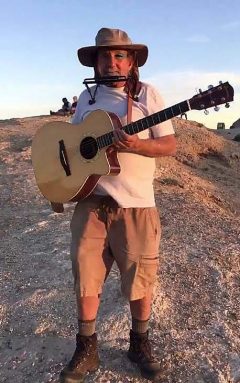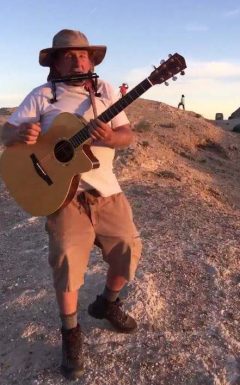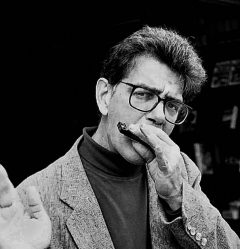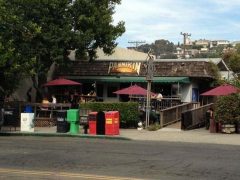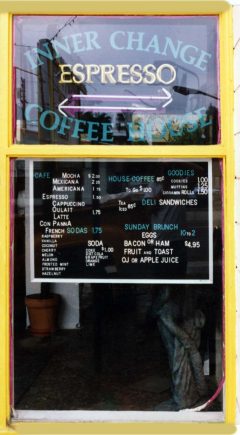Featured Stories
Harmonica Story
It was a hot, breezeless night, and there were no dry arm pits at the Javanican in Pacific Beach. The Grand Avenue Coffeehouse, two blocks south from the goony bar crawl of Garnet Avenue, was a location with the mutual benefits of being quieter and more isolated: you can actually hear the sticky roll of tires nearing the corner from a block away. The isolation isn’t the best for foot traffic, but it’s ideal for the music policy, as the venue is a converted bungalow, intimate as an elevator. The room fills with music the way air rushes into lungs. The attraction this Friday night was Rephael Harp, a sweet-playing folk blues guitarist who, additionally, is a genius harmonica player, maybe the best that San Diego has.
A grand claim, but tonight proved the point. Harp pivoted on a stool beside the small stage while a guest guitarist played Delta-style blues, slow and simple. Harp had a harmonica at his mouth and looted his archive of blues riffs. Brushing away the microphone he’d been using, his playing full-winded enough to fill the room, the music was a revelation, a history lesson in harmonica styles. Bar fight Chicago blues, with their punchy notes and drum-snapping changes, morphed into quick and clear bluegrass runs and the accelerated rhythms of runaway trains going in different directions. Harp played a rapid scale to his highest note, twisting it until its bends and turns slithered down the scale.
Rephael and the guitarist took the improvisation as far as they could, and then brought it back again to its snaking Delta beginnings, guitar and harmonica fading off in a trail of sad notes. The crowd, hardly a crowd at all, offered a smattering of claps. Rephael shook hands with the guitarist and smiled, turning toward the serving counter and chatting with friends who came to hear him. I walked up and stuck out my hand, which Rephael looked at quizzically and then gripped it, mischief and exhaustion swimming in his gray-blue eyes. Short, about five foot five, and bald with a blond crescent of hair that ringed his scalp. He gripped my hand and gave it a shake you’d expect from someone who hammers nails. His hands were calloused and layered in dead skin, evidence of work.
“That was a brilliant solo,” I said, unable to think of a less obvious way to start the conversation. “Why do you think that? I was only playing old licks, I wasn’t playing anything new,” he responded.
*************
Memories of the Mission Beach Board Walk in 1973 are blurry at best, but it seemed that there was often fog and mist lingering on the right of way, despite which season it was. At the time it was usual for me to start my day of lounging against the sea wall in the brightest, postcard sunshine San Diego could manage only to have the drifting mist gather by mid-afternoon, culminating in a bleached haze that made the area look spectral. I was hanging around the board walk and the short, congested courts of salt-licked beach houses for a year, and it was on one of those dreary nights that I ran into Boz (Raphael’s alternate name) in front of the Surfer Hotel at the end of Pacific Beach Drive where the Mission Beach Board Walk unofficially started. He wore a Mexican wedding shirt, with hair that reached his shoulders, and he was in the center of a group of young people who formed a throng that pushed itself into the narrow walk. Boz seemed to be addressing them, his eyes calm as bath water. I saw the group ahead of me as I walked up from the lifeguard tower, and, true to my habit, I pulled my harp from a vest pocket and started to play a wayward blues progression. My intent to impress them, get compliments, take a toke of whatever they were smoking, and then move on to the Belmont Park Roller Coaster.
*************
Boz looked up, cupped a hand to his ear.
“Hey brother, come over here and play that thing for us,” he called, waving an arm. The harmonica was at my lips as I came over. The group, a random assembly of earthen mellowness, parted their circle a bit, bringing me within inches of Boz, whose head was cocked at an angle, looking at the harp in my hand that I’d taken away from my mouth. No one was smoking anything, nor was there a bottle of grog anywhere. Boz smiled, his eyes widened curiously, and nodded for me to go on playing. Hindsight tells me that I played with the gasping hubris every beginner has, good ideas swamped with a glottal grinding of the gears.
Boz and his entourage nodded in what looked like appreciation as if they were tuned to a silent, low-key rapture. A strange slew of smiles. He held a leather wallet he was sewing together and placed it on the sea wall when I was done playing. He gave me a beatific smile.
“You’ve got some good chops there,” he said, pointing at the harp and then lifting the finger to my chin. “A little rough and messy, but you have a good tone, and you got the notes coming out right more times than not…”
Who was this guy?
I spent a year on the boardwalk, flashing my stuff at the drop of an E chord, memorizing all the enclaves and establishing myself as the harmonica guy, only to have a cipher tell me that my notes are played “…more right than not? …but you need to work on your rhythm, counting the time to a song, you’ll make it sweet and pretty, all your ideas will come together, not come out like a rush….”
Though bristling, I gave Boz my harmonica. “Show me what you mean,” I asked, “I mean, I work hard at getting this right, man…”
He took the instrument. The group rested against the clammy sea wall, with only Boz and I standing. A late mist crept in off the ocean, silent as shade on old brick.
“I dig it, man” he said. “Your licks are solid, but the rhythm could be smoother, like knowing where the beat is going to go so your good ideas stay good when you play them. Like this…”
It was a revelation. Boz placed the harp to his lips and spent the next ten minutes playing the best harmonica I’d ever heard—the sassy sound of Paul Butterfield meeting Sonny Boy Williamson’s graveyard moans, John Mayall crossing over to Little Walter. It wasn’t just that he played better… within a few seconds I realized I was in the presence of a world-class player. However, he could use only one hand much of the time, his control of the harp being such that he could achieve his affects with only one hand while with the other he’d demonstrate how the beat was going. Everything I knew was wrong again.
“Like this,” he said. His left hand held the harp his mouth as he snapped the fingers of the other, illustrating the time keeping, melody, and improvisation.
The group drifted away in different directions while Boz played, leaving him alone with me as he gave me the lesson. It was night now as the streetlamps tried vainly to burn through the fog. Boz stopped playing, pounding the saliva from the reeds, and gave me back the harp.
“Dinner time,” he said.
“You’re good,” said I.
“Thank you, bro. You see how that counting time works? Gives you something to put the songs on.”
“Yeah, yeah. When are you around here, man? You hang out here a lot? I’d like to learn some of that stuff…”
“I’m around most times; you’ll see me around. You got good ideas…”
“You’re fantastic,” I stammered. “Thanks for letting me play your harp. Dinner time, bye now…”
He turned and walked into the shifting murk. I felt ambivalent about what he had said. I was hungry, cold vapor poured from my mouth and nostrils. The South Mission Beach jetty was nearly erased where the coast line curved. And the world being a chance operation at best, I wouldn’t see Boz again. I would remain king of my sandbox.
“Go to hell,” I said.
*************
The decade was a string of jobs that had nothing to do with each other, from arts editor and freelance critic to prodigal carnival barker, singer in occasional hard rock bands, hotel desk clerk and warehouse manager to UCSD literature geek. What I accomplished was to acquire an over-sized affinity for booze, and I filled up bookshelves with wasted harmonicas, flat and rusted and full of sour notes, lined up like the green beer bottles college kids stacked in their dorm windows.
Harmonicas were the running theme during that time, and Rephael, nee Boz, from the boardwalk, who’d taken a new name in the following years as an initiation rite for a religious sect he’d joined, was the one I kept running into. Whenever I thought there was nothing in the lexicon I couldn’t utter, fluid as tap water, Rephael turned up and confirmed my amateur status. I was in Pacific Beach one night looking for a bar to get tanked in when I walked into a Mexican Restaurant on Garnet called Rudy Garcia’s. I knew Rudy from high school, and that night he hosted at the door, greeting diners with semaphore-like hand gestures and a smile that looked tighter than two coats of paint.
The smile shrank to a puckered “oh” when he saw me, vague resentments still smarting, and offered a cursory greeting. The smile returned to his rubbery face by degrees as the restaurant filled with people who were waiting for tables. I pointed to the stage area, a small platform, where Rephael, incidentally, was playing his harmonica in a neck rack, à la Dylan, while he played Dobro.
Rephael’s playing was like nobody’s business. This was the first time I’d heard him play guitar, and his slide playing on “Dust My Blues” had the sexy shimmer and strut down perfectly. The harmonica work was what I’d always remembered, fine and intricate.
“How about some ‘Whammer Jammer?” Rudy suggested, referring to the J. Geils Band hit of the time, which featured their harpist Magic Dick in a tour de force of jive, boogie, and speed. There were grunts of approval, belches, a fist pounding a table, a beer bottle falling over.
“Magic Dick, eat your heart out!” Rephael said, and started playing, harmonica flat on the microphone. He essayed on the tune, double timing the tempo, whizzing through the jump-cut changes. I was good and goosed by this point, three empty long necks in front of me. My vision doubled to Rephael’s double tempo. Swimming in warm thoughts, I took a harmonica from my back pocket and started to play along, elbows on the bar, going off willy nilly, cupping the harp so no one else could hear me, a private duet between the Muse and myself.
*************
By the summer of 1983, I had graduated from UCSD by the barest of qualifications, drank my way out of a long-term relationship, and had a job that was at risk because of my habit of pounding three Club can cocktails on my lunch break. I was sitting at the La Jolla Pannikin on a day off, an Anchor Steam beer on the patio table in front of me, swimming in the eddies of my fluid, grandiose thinking under the bright and broiling roast of the sun, when Rephael pulled up alongside the cafe on a racing bike. He looked healthy, I remember thinking, the son of bitch is probably still a better harp player than I am.
Rephael locked up the bike at the stand in front of the cafe and was walking up the walk to the serving counter inside the converted cottage that served as the Pannikin Cafe proper. I shouted his name, standing up.
“Rephael” I called, sticking out a hand to be shaken. He looked over his shoulder, lowered his sunglasses, and squinted, crow’s feet branching out from the ends of the eyes. He stared for a second. “I’ll be back,” he said. “I need an iced coffee…”
The rest of the encounter is a smudged charcoal comic strip of images, but what is vivid is an image of an outdoor table, filled with people having conversations that overlapped one another like strewn sections of a Sunday newspaper. Rephael, hardly ever seeming the shy one to perform, had taken a harmonica from a dock kit he carried with him and again played music I could only dream of. I had no harp and sat there, getting increasingly drunk and witless, slugging on the lukewarm beer.
It was late afternoon and the sun was setting, and the patio was clearing slowly. Rephael rose finally to leave. “Rephael” I said, “you sound great.”Rephael’s grimaced, his face tight as a drumhead.
“Thanks,” he said, pushing his hands into his fingerless riding gloves. He took the empty chair next to me, leaned over, saying almost in a whisper, “Playing music is something I don’t know what to do with. I’ve been living away from town, from San Diego; I needed to get away from the old places, and I’m only here doing some work.” He paused and looked down. “I’ve had a bit of an alcohol problem and it’s gotten me down, so I moved away to try to hold it together. I’m going to see what comes next, I don’t know…”
*************
Rephael Harp was born with the name Mark Bosworth in 1951 in Salt Lake City, Utah. He and his family moved to Pacific Beach in 1953 after they had lived in Idaho Falls. Next stop, Loring Street. He went to Einstein Jr. High School and then the family moved to Huntington Beach. They lived there four years.
“I think I started playing harmonica when I was 14 years old; music was always my first love. My father introduced me to John Mayall’s music in 1968, and I went ‘yeah,’ because I’d been listening to the Lovin’ Spoonful and the Rolling Stones and I was ready for the next thing. Both of those bands had songs with harmonica on them that I liked, but it was Mayall’s ‘Room to Move’ from the Turning Point album. It was classy, unadulterated harmonica, not distorted in anyway, it was just pure harp.”
“I got my first harmonica in my Christmas stocking,” he said. “I wanted the drums really bad, because I think maybe I liked my heartbeat, but the harmonica came in my stocking and I thought what the hell. I liked to play it, and I thought of the souls of deprived black people.”
Like much of what he says, Rephael’s comment drifted into silence while his eyes seemed to withdraw to study the graffiti on the walls of his soul. The awkward finally passed and he cracked into a waltz time version of Leadbelly’s “Bourgeois Town,” a song as political as it gets. The harmonica solos were fast and lacerating, cutting the chord changes into seeming halves.
“I’d lived all over the place during the late sixties and early seventies, but in 1971, I came back to PB to do a little job, to clean up some houses and paint them for this friend of mine’s girl friend’s mother, a real lady. I was selling acid at the time, and I was doing too much of that stuff, and that was when I met the Children of God family in Balboa Park.
“That was May 22, 1971, in front of the Zoo, and I said I’d go with them. It was a miracle kind of thing. When I was a senior in high school up in Huntington Beach in 1969, I happened into a coffeehouse where they were praying. They’d talk to you and see how you were doing and then they’d ask, ‘Would you like to pray with us?’ I said, ‘Yes, man,’ because I was sad at home. I was smoking a lot of pot and being down because my parents had divorced. I never felt my Dad liked me, so I got on my hands and knees with them and prayed ‘God, Jesus, let me live my life for you.’
“Anyway, I left there, feeling a little better, and two years later I ran into the same group of people in front of the Zoo here in San Diego. We talked again, and they asked me if I’d like to come live with them. ‘Yeah, I said.’
“The Children of God were real warm, like a family. We got up in the morning and said our prayers, we sang our songs, and we did continuous service work for the people. We got kids off of drugs, we brought them into the communes, taught them about the Bible and about love, and we all interacted peacefully. We got food from the market for people who were hungry, we called it procuring. We’d go to different businesses and say, ‘Look, we’re with a Christian Organization and we wanna help kids, and would you like to help?’ They’d usually give either food or money. It was pretty good, you know? There were good hearts involved and it all had a good motive.
“I gave up harmonica for a year as part of a vow I took with them. If I still had the desire to play after a year, it was thought that it was probably God’s will that I should do so.
“At that time, they also gave me a new name, Rephael, from a page in the Bible. I didn’t mind that.
“I started drinking when I was with them, because there were no rules against it, really.
“The Children of God was a sincere organization, and you have to compare the amount of good they did against whatever bad might have been done. I mean, the main guy, who called himself Moses David, was trying to instill a freedom in people, trying to get them to get them to see, for example, that sex wasn’t a sin, and the way he put it was something like that when a woman was witnessing to a man. She could go all the way and do the dirty deed and she’d be doing it for Jesus, which was unheard of in the Christian religion.”
Rephael was with the Children of God for two years and I asked why he left the sect, which he still calls the Family.
“Why did I leave?” he repeated, taking a long pause. “I wanted to surf!” he said finally, laughing.
Surf, he did, but he returned to playing music, harmonica and guitar with an energy and inspiration fueled, no doubt, by the spiritual principles he picked up along the way. His harmonica work was featured on the original soundtrack the 1996 surf film Liquid Stage (directed by Michael Bovee and written by Robert Greaves), which aired on KPBS. Before that he was a featured harmonica player with the Wade Preston Band during the time the pianist had an extended residence at the esteemed Elario’s jazz club in La Jolla. Rephael adapted his harmonica expertise to a good many different projects. The variety of projects are broad and many, but I would say that my favorite of his endeavors was his tenure as a regular performer at the now-closed Inner Change Coffee House in Pacific Beach, a venue that highlighted many young local musicians that included Jewel and Jamie Shadowlight. My jaw figuratively dropped because of the way he made the harmonica express every emotion so fluently. And he would call me up to sit in a few times, the sound being something that sounded joyful, energized, dueling improvisations by two players eager for the next round of trade offs. I ran into him in Pacific Beach recently while walking through the neighborhoods. After some moments of catching up with each other, he went and got a harmonica and his guitar from his apartment. We went outside and leaned against a parked car, playing the blues, brash and bawdy. Some young men were also outside drinking beer and came to be our audience, bobbing heads and yelling swear words of exclamation as Repheal and I played on. It was an amazing moment in my recent experience. Somethings do not change. It was the most profound kind of fun. As well it should be. Play on, Repheal.










